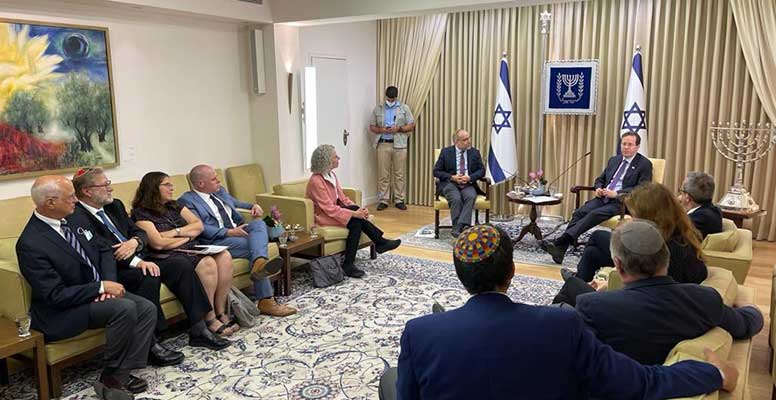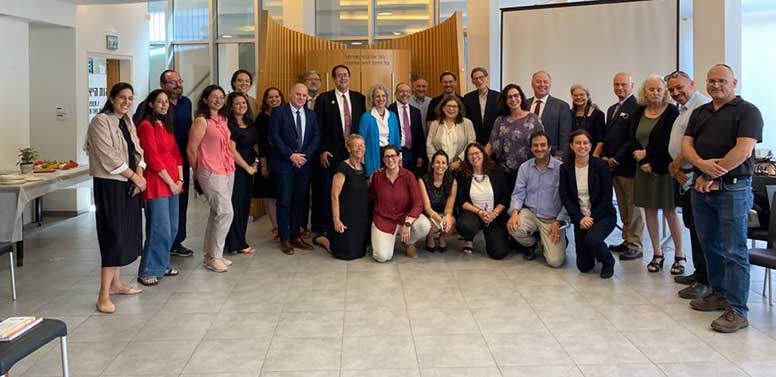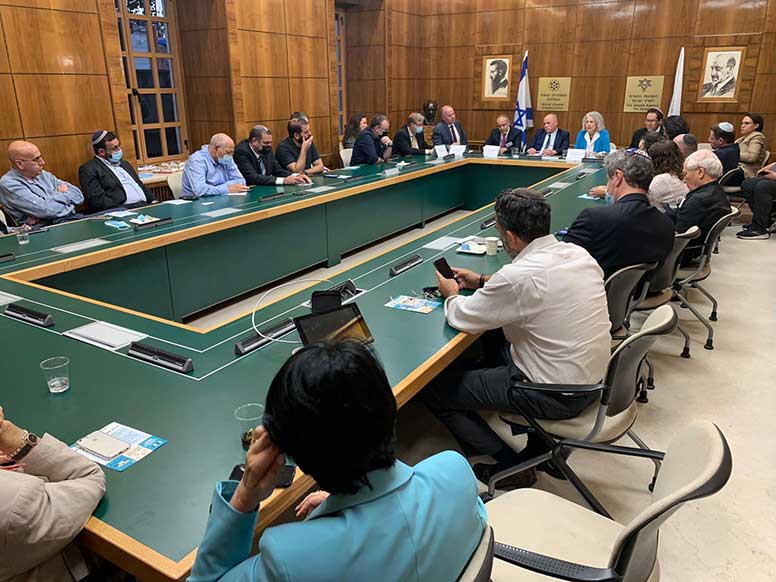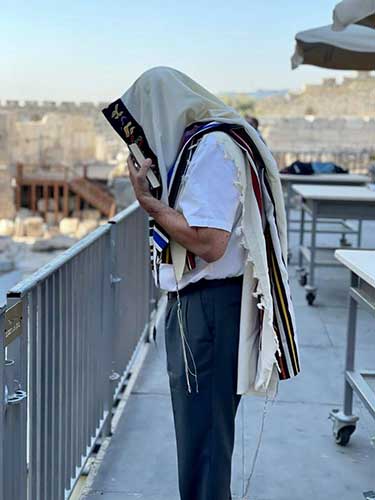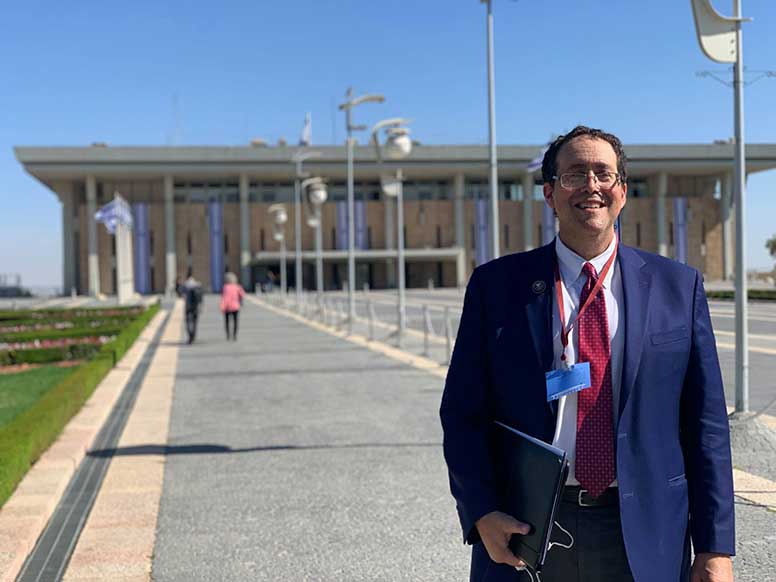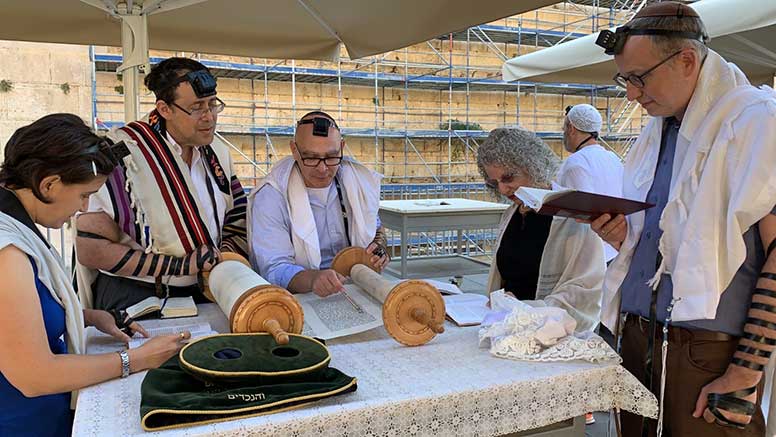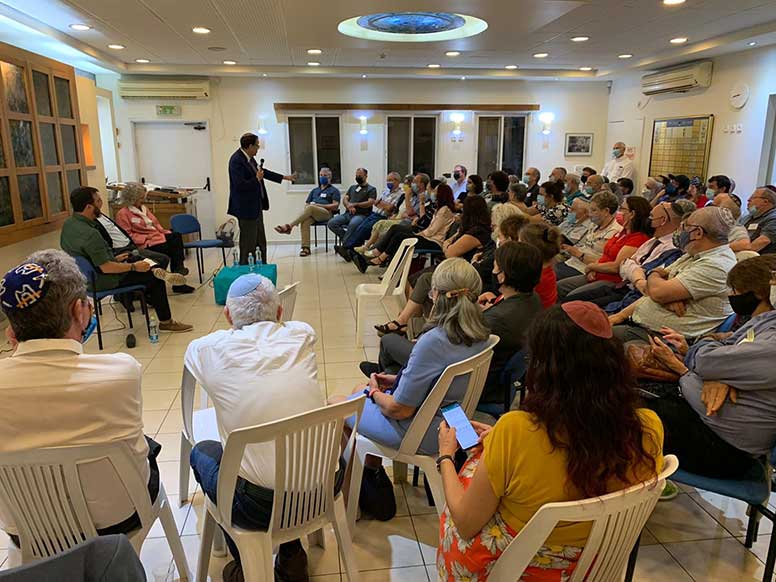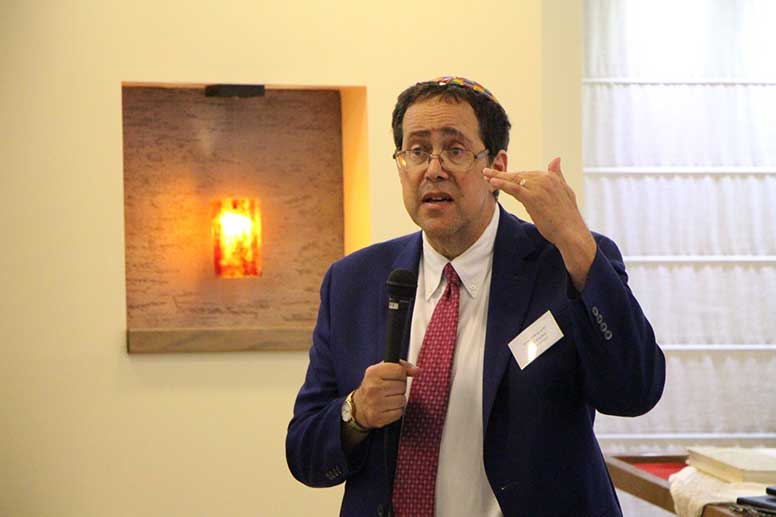This week I participated in a Conservative Leadership Delegation to Israel to confer with Israel’s new President, cabinet ministers in the new coalition government, members of the Knesset from multiple political parties, and leadership of the Jewish Agency. I also spoke on two panels (with JTS’ chancellor and the CEO of the Rabbinical Assembly) on Tuesday evening and again on Wednesday night.
We met with a full panoply of Israeli leaders from across the political spectrum, inside the new government and in the opposition. I came away inspired by a collective resolve to innovate to improve the lives of all Israelis, Jews, Arabs, Druze, Bedouin, and to better the lives and living conditions of Palestinians. I also heard a common commitment to strengthen Israeli democracy and human rights, to address issues of sustainability and climate change, and to reinvigorate the relationship between Israel and the Jewish people in all our diversity, across the globe. These goals are crucial for the future of Israel’s vitality and democracy.
The 3-day trip was packed with panels and events, including transformative series of conversations, expressing solidarity with Israel in these difficult times, elevating the perspective and interests of Conservative/Masorti Judaism in the eyes of Israel’s new government, and articulating an agenda moving forward. In every conversation, Los Angeles’ American Jewish University and its Ziegler School of Rabbinic Studies were active and visible in the leadership and engagement on the trip, with Israel’s President Herzog going so far as to comment that the Ziegler School is a well-known and important institution.
Tuesday
On Tuesday, we met for a briefing at the Ministry of Foreign Affairs, and then had a meeting with Minister Nachman Shai of the Diaspora Affairs Ministry. We then enjoyed a private meeting with the new President of the State of Israel, Isaac Herzog, who spent over an hour with our delegation. I had the pleasure of introducing Israel’s president to the bioethics of AJU’s Ziegler School’s own Rabbi Elliot Dorff, in addition to discussing Process Theology with him.
After a morning of briefings, we returned to the Knesset building to meet with MK Zvi Hauser (a former member of the Kotel Committee) and then with Minister Gideon Sa’ar, Minister of Justice. Both were remarkably candid and open with us.
In the evening, we drove out to the Masorti Synagogue, Yedid Nefesh, in Modi’in for a gathering of all the members of the Masorti congregants throughout Israel. The panelists included the JTS chancellor, the CEO of the Rabbinical Assembly, and myself, moderated by a brilliant Israeli comedian, Moshe Samuels. I spoke about the evolving relationship between Israel and American Jews, and I was able to affirm the range of ways that Ziegler students and rabbis continue to show deep connections of heart, family, and community that animate their rabbinic work and their Zionist spirit. Of course, the letter in the Forward by many rabbinical students (two from Ziegler) and my public response shaped much of our conversation and helped the Israelis see the depth of connection that still motivates our students (including those who signed) and the Conservative rabbinate. I reminded the audience that Ziegler students continue to spend their third year in Israel at the Conservative Yeshiva, continue to serve in Masorti congregations across Israel in partnership with the Masorti Movement, and continue to show support and activism through AIPAC, JStreet, and other pro-Israel organizations.
Wednesday
Day two of this whirlwind trip began with a meeting at the Schechter Institute with the leaders of all the Israeli Masorti organizations, with each having an opportunity to explain their role and current projects to the American delegation. We met with Minister Merav Michaeli, Minister of Transportation, and were scheduled to meet with the Minister of Defense, Benny Gantz, who had to postpone our meeting at the last minute (and how has rescheduled a virtual meeting with us), but we were able to meet with MK Yuli Edelstein, a Likud member of Knesset and the former Speaker. We also met with Tamar Zandberg, Minister of Environmental Protection.
We also met with MK Alon Tal, a professor of environmental studies at Tel Aviv University, and a new member of the Knesset. He is also an active member of a Masorti congregation (and grew up at the North Carolina synagogue that enjoys Ziegler graduate Rabbi Daniel Greyber as rabbi). I have known Alon for many decades and have worked with him on shared projects. He aims to make religious pluralism and environmental issues his primary focus while in the Knesset. We met with MK Gilad Kariv, the first Reform rabbi elected to the Knesset and now the Chair of the Constitution, Law and Justice Committee. At the last minute, Alternate Prime Minister Yair Lapid, Minister of Foreign Affairs was quarantined with COVID and will arrange a virtual meeting with us in the future.
The day would not be complete without a private Mincha service for the group, inside the Knesset building. I’m sure that was not the first time someone davened in that edifice, but maybe one of the first times the service was egalitarian!
We completed the evening back at the National Institutions Building in the heart of Jerusalem to attend a reception for the Members of the Executives of the World Zionist Organization and the Board of Directors of Keren Kayemet L’Yisrael. At that reception, I spoke on a panel with the JTS Chancellor and the CEO of the Rabbinical Assembly. Rabbi Stewart Vogel served as the moderator. I focused on the “Core Ideas and Commitments of Conservative/Masorti Judaism and Zionism,” and you can hear that talk (click to hear the podcast).
Thursday
Our third and final day in Israel began at the egalitarian section of the Kotel (Western Wall), a contested area that the previous government of Israel promised to designate as a place for egalitarian prayers. A group of Masorti rabbis and leaders gathered in this beautiful space for morning worship, complete with Torah reading. I was delighted to be called to bless the Torah for the third aliyah which brought to mind the great friends of the Ziegler School – our fabulous lay leadership and supporters – and the generations of great students, many now rabbis, and our brilliant faculty. In my heart, we were standing there together, in the heart of Jerusalem, offering thanks for our loving relationships, our shared vision, and the light we shine together.
After a meeting with the Conservative/Masorti rabbis of Israel and the rabbinic leadership of the delegation, we drove to Tel Aviv and met with Ya’akov Hagoel, Chair of WZO and the Acting Chair of JAFI, and then met with Minister of Intelligence Elazar Stern, who of course did not need to be briefed on our names and bios.
At our last event, we were given a private tour of ANU Museum by its CEO, Dan Tadmor. This renovated museum tells the story of the Jewish people across history, making a point that everyone at the museum should see themselves and their experience reflected in the exhibits themselves. Like the museum’s name indicates, there is only “us” and we all belong.
Finally, after a beautiful sushi dinner, we headed to Ben Gurion Airport and took our long flights home.
Our Agenda
In addition to articulating solidarity with Israel during these difficult times, and support for a broad agenda for justice, peace, and security for all its diverse communities and neighbors, the American delegation raised three explicit concerns with the new government:
-
We called for the implementation of the Kotel Agreement, nearly 5 years after the initial agreement was ratified (only to be tabled 6 months later). This necessary and timely proposal extends the non-Orthodox egalitarian prayer area for all people near the southern part of the Western Wall.
-
We urged Israeli legislators to support and defend the rights of Jews who convert or marry. Currently, the State of Israel fails to meet this sacred responsibility when its lawmakers refuse to recognize the practices of much of the Jewish people around the world.
-
We also raised the issue of government funding. In Israel there is no separation between state and religion. The government funds religious services and staff, but not equally, and not for all denominations. We asked for reasonable funding for Masorti congregations, institutions, and clergy.
In addition to Rabbi Artson the Leadership Delegation included Rabbinical Assembly and USCJ CEO Rabbi Jacob Blumenthal, RA president Rabbi Stewart Vogel, USCJ President Ned Gladstein, COO of the RA and Chief Program Officer for USCJ Rabbi Ashira Konigsburg, JTSA Chancellor Dr. Shuly Rubin Schwartz, Mercaz USA Executive Director Sarrae Crane, Masorti Foundation Executive Gideon Aronoff, Masorti Foundation Chair Heidi Schneider. We were joined in Israel by Executive Director of Masorti Israel Rakefet Ginsberg, Vice Chairman of WZO Dr. Yizhar Hess, President of Masorti Olami Sophie Fellman Rafalovitz, Executive Director of Masorti Olami, Rabbi Mauricio Balter, and RA Israel President Rabbi Mikie Goldstein.


